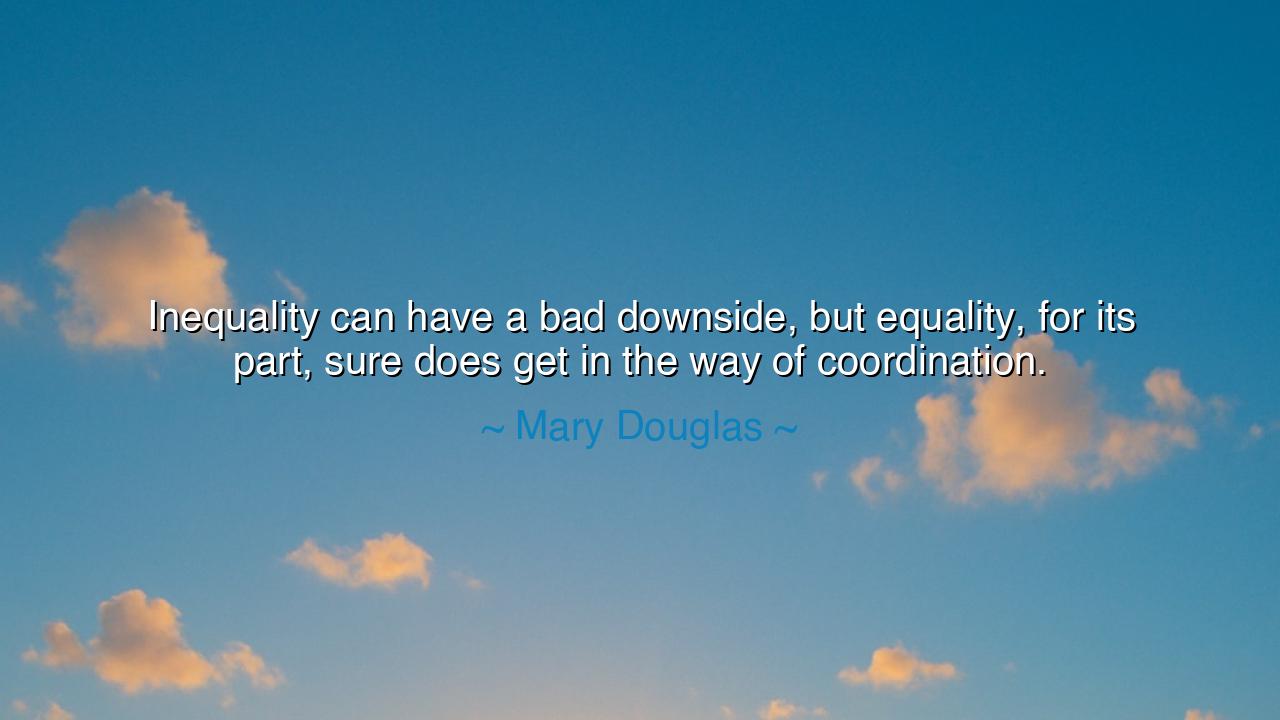
Inequality can have a bad downside, but equality, for its part
Inequality can have a bad downside, but equality, for its part, sure does get in the way of coordination.






The words of Mary Douglas, “Inequality can have a bad downside, but equality, for its part, sure does get in the way of coordination,” shine with the paradox of truth that only deep wisdom can hold. They remind us that neither inequality nor equality exists without consequence — that every virtue, if stretched beyond balance, becomes its own flaw. In this reflection lies the eternal struggle of human society: the yearning for fairness on one hand, and the necessity of structure on the other. To live well as a people, one must learn to walk between these two mountains — not bowing before hierarchy, yet not drowning in chaos.
In the ancient world, philosophers often wrestled with the same dilemma. Plato, in his Republic, dreamed of justice not as equality in all things, but as harmony among unequal parts. He likened society to the body — the head cannot be the hands, nor can the feet rule the heart. Each must know its place, not from pride or oppression, but from purpose. Mary Douglas, an anthropologist of sharp insight, echoed this ancient understanding: inequality may wound when used for domination, yet pure equality, without distinction of role or responsibility, can dissolve order itself. For without structure, even freedom turns to confusion.
To see her meaning more clearly, consider the tale of the French Revolution. The people rose with righteous fire against tyranny, crying for égalité — equality. Kings fell, chains broke, and for a moment the air seemed filled with the promise of a new dawn. Yet soon, without order or coordination, that promise collapsed into blood and fear. The guillotine replaced the crown, and chaos ruled where reason had been meant to reign. The lesson is not that equality is evil, but that without wisdom and unity of purpose, it cannot endure. Equality, untempered by discipline, becomes disorder; freedom without balance becomes its own prison.
In every group, every family, every nation, there must be coordination — a shared rhythm of duty, skill, and leadership. Equality of worth does not mean sameness of role. The farmer, the healer, the teacher, the leader — each holds a different place in the order of life, yet all are sacred in purpose. The ancients called this the law of balance, the divine equilibrium that holds the stars in motion and keeps rivers flowing to the sea. To ignore this law, to make all things identical, is to break the harmony that binds the world together.
Yet Douglas also warns us not to glorify inequality. When one class hoards power, when voices are silenced and the few command the many without justice, then coordination becomes tyranny. The purpose of structure is cooperation, not dominance. In every kingdom that fell — from Rome to Babylon — pride built the tower that collapsed upon its builders. True leadership is not hierarchy for its own sake, but guidance for the sake of unity. To command is to serve; to lead is to listen. Thus, equality and order must dance, not compete.
There is a profound humility in Douglas’s observation. She does not romanticize fairness nor worship authority — she points to the fragile art of balance that sustains civilization. In our time, many cry for absolute equality, forgetting that even the universe itself thrives on diversity. The stars are not all the same brightness, the trees not the same height, and yet together they form beauty and coherence. A just society must mirror this truth — recognizing the dignity of all, while honoring the necessity of different gifts, responsibilities, and roles.
Let this be the lesson for all who seek to build or to lead: do not chase perfection in equality or hierarchy. Instead, seek harmony — that sacred middle path where fairness meets function, and compassion meets discipline. Respect the worth of every soul, but also the order that allows them to flourish. For when equality blinds us to the need for coordination, we lose direction; and when inequality blinds us to justice, we lose humanity. Only through wisdom — the wisdom of balance — can a people stand firm against the winds of chaos and the temptations of power.
Thus, Mary Douglas speaks as one of the quiet sages of the modern age, reminding us that the world’s strength lies not in sameness or superiority, but in the cooperation of the different. Like instruments in an orchestra, we must each play our part — distinct in tone, yet united in purpose. And when we find that rhythm — when equality and coordination walk hand in hand — then, and only then, does society truly sing.






AAdministratorAdministrator
Welcome, honored guests. Please leave a comment, we will respond soon